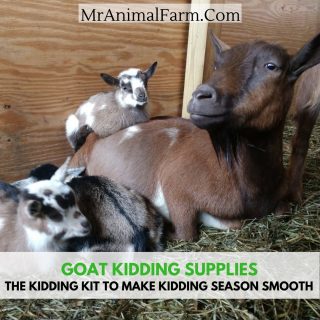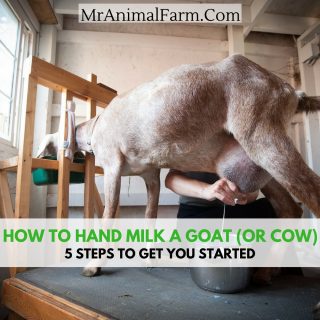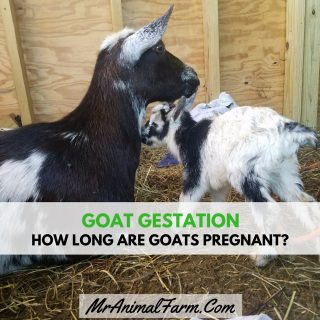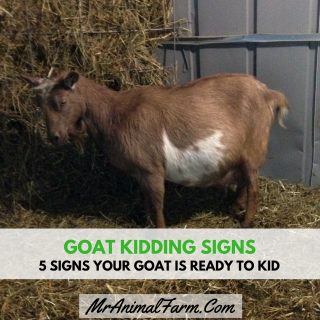If you are breeding your goats, then you are probably excited for all the bouncy babies you will have soon. However, before they get here, you will need to ensure you know how to take care of baby goats so that you have the most successful kidding season possible.
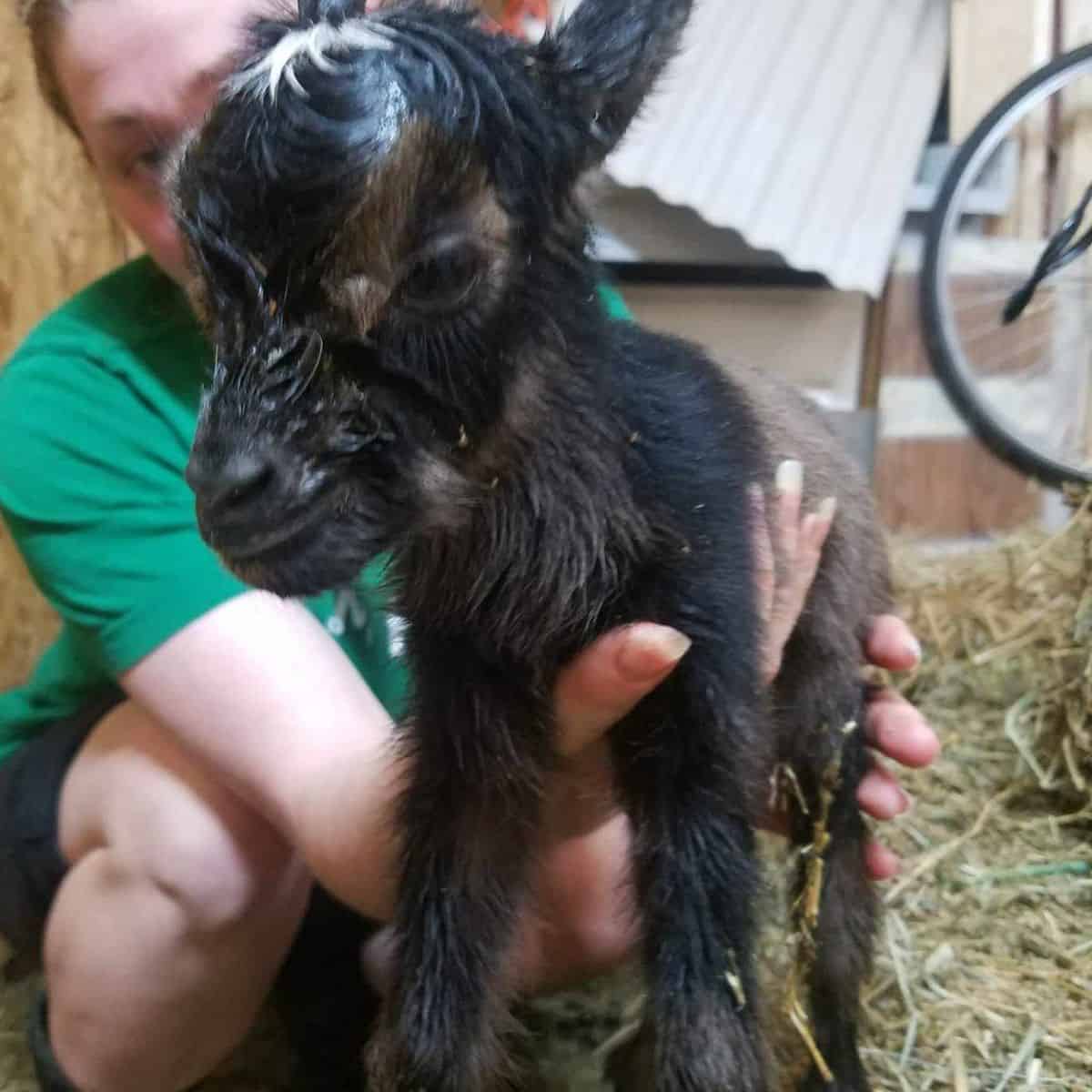
Learning how to take care of baby goats is not difficult. You need to know how to do their health check and provide any assistance right at birth. Additionally, baby goats will need to be fed milk either via nursing on their dam or via bottle for at least the first 8 weeks of their lives. Finally, there are some routine health procedures you will need to know such as banding, disbudding and CDT vaccinations.
Proper baby goat care is essential to making sure that your kids are healthy and happy. You have likely spent time learning about goat heat cycles so that you can breed your goats. You also have probably learned about kidding supplies and goat labor signs as well. So, make sure to review all the details below on baby goat care so that you are ready for everything when your kids finally arrive.
Baby Goat Care
Proper care starts right at birth with a newborn check and a few other essential items. You must also decide how to feed your baby goats (leave them with their dam or put them on a bottle). Finally, there are several things you will need to know how to do such as banding (for wethers), disbudding, tattooing and giving CDT vaccinations.
All of this is fairly easy as long as you know ahead of time what you need to do and when you need to do it. That way you are well prepared at each step and aren't surprised or miss anything along the way.
What to do At Birth
During kidding, if at all possible, you should be there with your doe. This will allow you to provide any assistance that she may need (for example, if she has a kid stuck).
Additionally, being there at kidding will allow you to perform a quick check on each kid and give it any help that it may need such as getting warmed up or getting latched on to nurse.
Clean and Dry
Kidding season is typically late winter/early spring and often times it can be cold or a bit chilly out. Even if the weather is warmer, kids can still get chilled if they don't get dried off quickly enough.
It is important to make sure that any birthing goo is quickly removed from the kids face - eyes, nose, mouth. You don't want them to inhale any of that as it can cause respiratory issues.
After their face is cleaned, you can allow their dam to do most of the rest of the cleaning - this helps her bond with her new kid. However, if she is having multiple kids, or if the kid seems to be getting chilled then you may want to jump in to help her clean them up.
If a kid does get chilled (temp should be 101.3 - 103.5), then you should act quickly to warm them to normal temp. You can do this with a blow dryer, putting them under a heat lamp or putting them in a plastic bag and submerging (not their head) in a warm water bath.
They cannot eat until their temperature is normal or they will be unable to digest their food.
Make sure to keep a check on them especially during the first few days to ensure that they are still staying warm. Chilled kids will be lethargic, can shiver, look hunched and have their heads hanging. (Though these can also be signs of other issues such as low blood sugar).
Newborn Check
As the kid is getting cleaned off, you want to do a quick check on them and make sure everything appears normal. You can check for sex (make sure boys have both testicles).
Also check to make sure everything looks formed correctly, breathing appears normal and that they seem healthy in general. We have had issues such as bowed legs, feet that don't go flat on the ground and eyelashes that curved into their eyeballs to name a few.
Dip Umbilical Cord
You should have iodine and dental floss ready to take care of their umbilical cord. If the cord doesn't break on it's own, then you will tie it off with dental floss and break it.
Then dip the babies cord into the iodine to help prevent any bacteria from getting into it before it dries and seals off.
Colostrum
Making sure that newborn baby goats get colostrum quickly is absolutely essential. They should ideally have colostrum within 1 - 2 hours of birth.
Over their initial first 24hrs they should get approximately 10% of their body weight in colostrum. If they are nursing from their dam, then you won't know the exact amount. But if they are up and active, they they should be good to go.
You can help them find their dams teat and get latched if they are having difficulty. We always make sure to see every single kid latch on their own before we leave them alone with their dam.
If they can't seem to easily latch - make sure their is milk coming out of the teats (sometimes they get clogged). If they still can't latch with some assistance, we usually syringe or bottle some colostrum to get them going.
Need some help to keep your goats healthy and maintained? The G.O.A.T Herd Management Binder has you covered from supplies to routine care reminders.
Feeding Baby Goats
There are two main ways to feed baby goats - via their dam or via a bottle. Both ways have definite pros and cons, so you should weigh each option to decide what is best both for you, the doe and the kid.
Bottle fed kids tend to be more friendly (but this isn't 100% of the time). They are also WAY more work as you have to feed them round the clock. And, you will have to milk their dam right away. So be sure you know how to hand milk a goat.
However, sometime bottle kids are easier to handle. Also, if you have a dam who isn't making enough milk, had too many kids, isn't a great mom, or had a stressful kidding then bottle feeding might be a great choice.
Dam raised kids do tend to be a little less friendly overall - but this can be remedied by lots of handling. The dam gets to keep and raise her kids for a while and for most does this makes them happy.
Dam Raised
To feed dam raised kids, you really don't need to do much. Make sure they figure out how to latch directly after birth.
Also, check in regularly to ensure that they are getting enough milk from their mom. They should have full bellies and be active.
Bottle Fed
Bottle feeding is a full time job at first. Depending how their size and how much milk they can take at once, you will be feeding them every few hours around the clock at first. After a few weeks, you can decrease the frequency.
Weaning
Kids can be weaned around 8 weeks of age. They will start nibbling on hay and grain when their rumen starts to develop - typically the 3 week range or so. And by 8 weeks they should be able to eat enough roughage to be taken off milk.
However, if they are staying in a herd with their dam, then you can let her wean them when she is ready. Some does will kill them off sooner and others will let them continue to nurse for quite a while.
If you are bottle feeding, you want to slowly wean them off their milk. So, we usually by 8 weeks are at two 16oz bottles per day, we may cut one to 8oz for a week. Then cut both to 8oz for a week. Then one to 4oz for a week and so on. Weaning doesn't have to go that long necessarily, but the longer they are on milk they tend to have better growth in their first year.
What Do They Need - Baby Goat Supplies
You don't need a ton of extra supplies to take care of your baby goats. However, it is important to have some things on hand to ensure they are easy to access if you do need them.
Dry, Warm Shelter
Your goat kids will need a dry, warm and draft free shelter to ensure that they are able to stay warm. We usually keep our does and kids in their kidding pen for the first few days. There are lots of different goat pen ideas you can use. They are then allowed into the kid goat fenced area to explore and play.
Milk
As you already know from the feeding information, your goat babies will need access to milk for a minimum of 8 weeks. Goats milk is the best thing to feed.
If you don't have access to goats milk, and are bottle feeding, then you can use goat formula replacer or whole cow's milk.
Other Food Supplies
Once they are a few weeks old, they will need access to the same food that the adults do. You will need to know how to choose quality hay and leave that for them to eat anytime (though they won't do more than nibble it for a while). They will also need water, baking soda and minerals.
So, their food needs are basically the same as when raising any adult goats, just at a much smaller rate and add that milk in.
Medical Supplies
It is good to have some general medical supplies on hand also in case you need them. Things like Probiotics, Nutridrench, Coccidia treatment and antibiotics.
Banding - wethers
If you aren't familiar with goat terminology, a wether is a male goat who is fixed and therefore cannot reproduce. Wethers make good pets and can be kept with bucklings or doelings.
If you are not keeping your boys in tact, they should be banded around 8 - 12 weeks of age.
Disbudded vs Polled vs Horned
Most goats are born horned. However, some are born polled - this is when they are naturally hornless. At least one parent must be polled in order for kids to be polled.
If your goat kids aren't polled then you will need to decide whether or not you will disbud (burn the horn buds so horns don't grow) them. Typically they will need to be disbudded anywhere from a week to three weeks of age depending on goat breed, sex and size of the kids.
Tattoos
If you will be selling your kids (or retaining them) as registered goats, then most registries require them to be tattooed.
Typically tattooing can be done in their ears (like for Nigerian Dwarf goats) or tail webs (for other dairy goats like LaManchas).
Vaccinations
Baby Goats don't really need many vaccines. The most standard one is the CDT shot. They will typically get this at around 4 weeks and then 8 weeks (exact timing can vary a bit depending on what brand etc you use).
Health Issues
Of course there are a wide variety of potential health issues that you need to be aware of when caring for baby goats. This is not an exhaustive list, but some of the more common ones are:
Coccidia
Coccidiosis is an internal parasite that is quite common in goats, especially kids. It is something that is normal to have, however, they can quickly get an overload which will make them sick.
It is important to watch out for this as it can be treated, but if left untreated can kill kids rather easily.
Worms
While worms are a large issue for adult goats, they are not as big of an issue for kids. But, they certainly can cause an issue for them. So, it is important to keep a Famancha check on kids to make sure they look good.
Respiratory issues
Respiratory issues are common in baby goats. This can be caused from temperature changes or aspiration of birthing fluids or being bottle syringe fed.
Common symptoms are heavy, rapid breathing. As well as a fever and congestion.
Under or Over Eating
Kids that are not eating enough, especially young ones, can experience blood sugar drops. This is usually shown by lethargy, hanging head and standing in a hunched position. Make sure that kids stay active and have full feeling bellies to avoid this.
Kids can actually also over eat - typically with dams who have a single or make a ton of milk or bottle kids. Overeating can cause tummy issues and diarrhea.
FAQ
Why do baby goats wear pajamas?
Mostly, people put pajamas on their baby goats because it is cute. However, sometimes pajamas are used to help keep the goat kids warm.
Do baby goats need a heat lamp?
No, they do not need a heat lamp. Occasionally, especially if they are born when it is particularly cold or if they are having issues keeping their temperatures up they may need some supplemental heat from a heat lamp.
Do baby goats drink water?
Yes, baby goats do drink water. However, they mostly consume milk in their first several weeks. So, you should provide them with water, but you won't see them drinking a ton of it when they are super young.
When can baby goats go outside?
Baby goats can really go outside anytime. However, make sure that it is not super cold. Also, they are small and can fit through typical fencing, so you might want to keep an eye on that. Their size can also make them more prone to getting caught by predators. So, it might be good to use a livestock guard dog like a Karakachan.
Do baby goats like to be held?
This will vary from goat to goat. Most baby goats like being held especially if they are bottle kids or have been given a lot of human attention from a young age.
If you need more help keeping your goats healthy and well taken care of, check out the G.O.A.T. Herd Management System - worksheets, calculators, supply management and more to keep your goats in tip top shape while cutting down on time.

